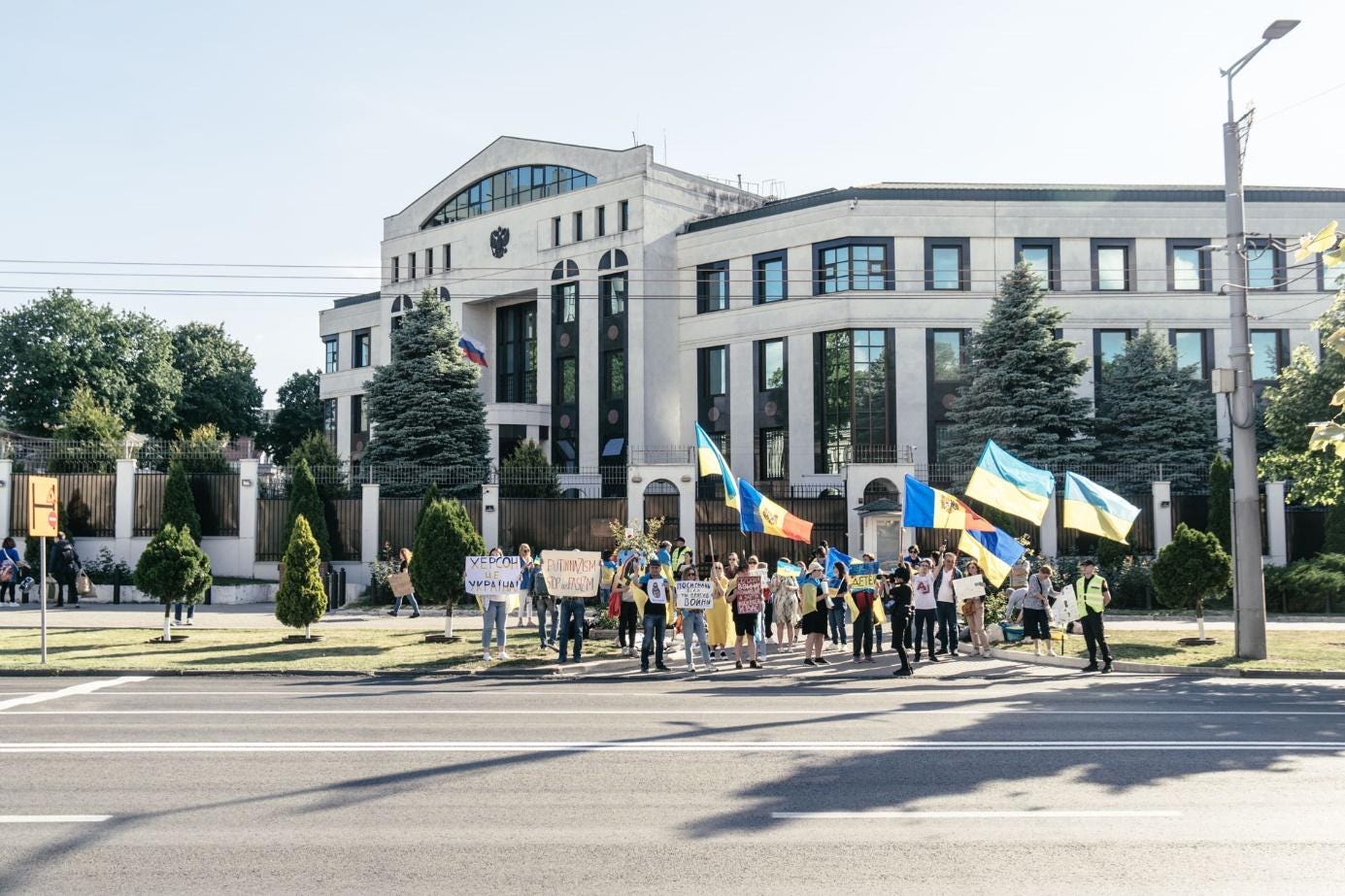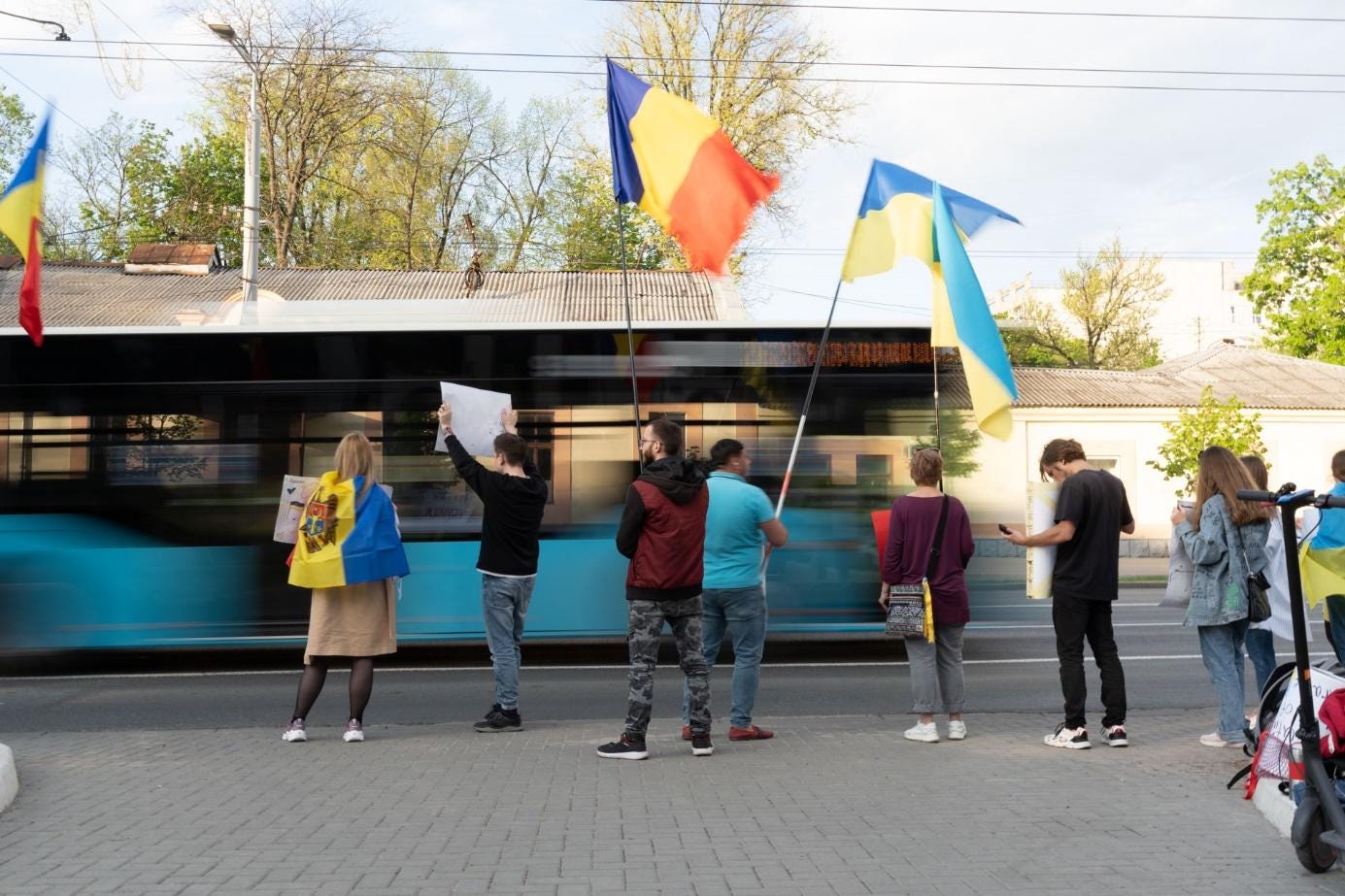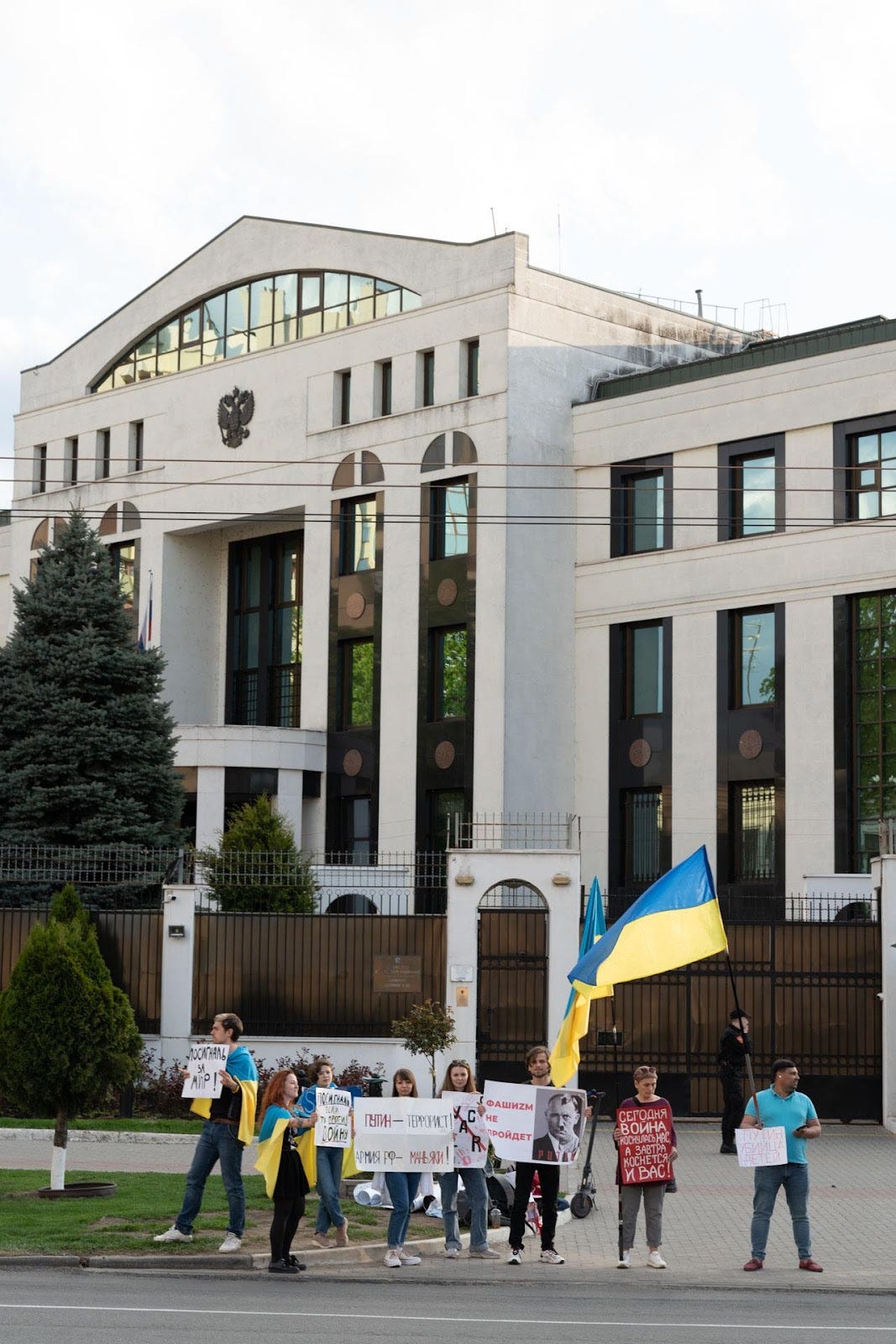Protests in Moldova: Little country, Big voice
Written by: Carlotta Böttcher, Photography by: Florian Scheible, Edited by: Clary Estes and Sharmishta Rawat
In the face of war
The Republic of Moldova has never been known as a country with a rich culture of protest. And while it may not have a history of protest that countries like France do, it does however have a legacy of protests that has reflected the recent political and social upheaval of the country, some of which have ended violently.
As such, with the ongoing invasion being waged in their neighboring country of Ukraine, Moldova finds itself in a precarious socio-political situation that, until recently, threatened to see violence spill over into its borders. For a country with effectively no military presence and no economic weight to pull, one might ask: Is this a reason to be quiet? Is this the time to attract as little attention as possible? Activists who have been gathering daily in front of the Russian embassy in Chişinău (the capital of Moldova) and have been protesting against the war since its very beginning certainly do not think so.
Hitting close to home
The afternoon sun burns hot on the asphalt, a loud siren goes off. Yuliya, a Ukrainian protester, gets goosebumps even though she no longer resides in Kyiv. Rather, she finds herself in the Moldovan capital of Chişinău, a safe place for now. The memories of Ukraine, however, are omnipresent. Five weeks after the war began, the native of Kyiv decided to leave the country with her 12-year-old daughter. A missile had hit the neighbor's house and the war had come too close.
Looking at the map of Moldova, it looks like it is being nearly swallowed up by Ukraine. The 30-year-old says that although she knew this country existed, she never thought she would come here. Three months ago, she was still dreaming of trips to Paris or London, which had suddenly become realistic with her new, well paying job in a jewelry store, which she got at the end of last year. Chişinău, which is much less cosmopolitan than her hometown of Kyiv, is not exactly the place she imagined herself living this year. Her new apartment looks straight at the Russian embassy which is how she became aware of the daily protests. Initially, it was the only place in the new city she visited regularly.

The embassy building makes an imposing impression as it looks out onto the four-lane Ștefan cel Mare main street. It is guarded daily by at least two policemen, often more. The street is named after Stephen the Great, a national hero revered in both Moldova and Romania, and even Russia to a degree. The location of the Russian embassy is emblematic of Moldova's turbulent history as a small country caught between two powerful geopolitical forces.
In fact, Moldova has long had a storied back and forth history between Romania (the West) and Russia/the USSR (the East). It is a history that mirrors Ukraine’s in some ways. By the beginning of the 20th century, with the onslaught of the First and Second World Wars, Moldova found itself in a push pull between Romania (which referred to it as ‘Basarabia’) and the oncoming Soviet Union, who eventually won out and subjected Moldova to many of the same atrocities seen in Ukraine around that same time, such as manufactured famines and deportations to the Eastern Soviet States.
The Independent Republic of Moldova has only existed since 1991. There is however the still widely unknown issue of the separatist region of Transnistria in the east of the country, which is supported by Russia and seceded from Moldova by 1992. It is a relationship that has stayed strained but peaceful in the years since. The Ukrainian invasion, however, has threatened to break that peace, luckily, as yet to no avail. Then, as now, the Moldovan population is largely divided into a more Western-oriented, Romanian-speaking part, and a Russian-oriented, Russian-speaking part.
From Hero to Villain
The split also runs through many Moldovan families, Vadim explains. The 29-year-old stands in front of the Russian embassy almost every day. He holds a sign showing the faces of Hitler and Putin merged together. Next to it in Cyrillic letters is written, "Fascism will not pass away" - a phrase that Putin also uses to justify his war in Ukraine.
Vadim says that as a teenager he would never have imagined demonstrating against Putin with a blue and yellow flag around his shoulders. His mother is Russian, and he, like many of the activists, grew up watching Russian television. For him, the Russian head of state was a role model in his childhood years. He was impressed by his strength, and had thought that he was "just a cool guy." Then, in his teens, Vadim joined the "Unionists," a movement that sought the political unification of Moldova with Romania. Vadim's father is Romanian, which is why Vadim also received Romanian citizenship and the freedom to travel throughout Europe. This summer he will go to Estonia to "finally study at a cool university," he says.

While many Moldovans are leaving the poor country because of a lack of future prospects (almost a third of all citizens live abroad), many Ukrainians have come to the small country to seek refuge since the war began. The refugees who remain in Moldova hope for an early end to the war and the ability to return home; they do not want to continue to the richer West Europe.
Officially, Moldova's role is neutral. Its 100 percent dependence on Russian gas and the stationing of Russian soldiers in the separatist region of Transnistria make a clear position towards Ukraine impossible. It is also important to note that Moldova applied for EU membership in early March, a process that is now being sped up in part as a response to the invasion.
Yet, it is notable that by and large civilian support for the refugees is huge. The advertising slogan for Moldova was unceremoniously changed from, "Discover the routes of life" to the apt, "A small country with a big heart." And the protesters in front of the Russian embassy also set a clearly visible and audible sign of solidarity with Ukraine every day.
Like Yuliya and Vadim, many people joined the protests, both Ukrainians and Moldovans. Passing by in the bus or from the car, they saw the Ukrainian flags and read the protest signs. Meanwhile, there are over 500 people in the Telegram group through which the demonstration is organized. Every day they gather in front of the embassy for several hours. And even if only two or three people find time, the protest is loudly supported by honking passing cars. There are occasional pro-Russian counter protests in the same location, but they have yet to gain even a fraction of the strength of the anti-war protests.
Reclaiming a democratic tool
This is not a matter of course for the Moldovans, says Elena. The environmental activist with the purple-dyed hair stands out in the city. "Many people here are not used to expressing their political opinion aloud, or even to protest," she continues. Many people, she says, still have the Soviet mentality deeply internalized. Moreover, in the recent past it was common practice in Moldova for political parties to pay people money to demonstrate for their interests. Elena knows numerous stories of friends who were offered money to demonstrate at the university or sports club. She says, "We need to reclaim the democratic tool of street protest." Even if not everyone agrees. Some passers-by have scolded the protesters in front of the embassy, telling them to be quiet or Putin would attack Moldova as well, Elena continues. Of course, she also has a queasy feeling. "If the Russians come, they will be able to take Moldova in five minutes," she says. "But what else can we do? Duck away, keep quiet? Surely not!"

And indeed, the protests have been heard through the closed windows of the embassy, even in Moscow. At the end of May, there were repeated complaints from Russian diplomats that they cannot work with the noise and constant honking. The Moldovan parliamentary speaker pointed out to his colleagues that, although it may not be common in other countries, in Moldova there is freedom of expression, in front of parliament, embassies or elsewhere. And the demonstrators respond to the complaint by continuing to loudly play the sirens and sound recordings of bombings in Ukraine. While this is stressful for protesters like Yuliya and other refugees, they believe Russian diplomats should realize what it is like to "work" under such circumstances.

And Yuliya too has to decide whether to return to Ukraine and live and work under constant air raid sirens, or to build a new life in Chişinău. In the meantime, she has settled a little, though not as well as her daughter who is constantly on the move and has already made new friends, Yuliya says. But if Yuliya doesn't go back, she'll lose her job.
Her boss does not have to make this decision; she is in Germany with her family and can manage the business from there. Yuliya however does not have the luxury of a choice. A safe life for her and her daughter simply does not exist in Ukraine at the moment. And so she will stay on in Moldova and continue protesting at the embassy across the street.







This story is more clear to me than many others as I have visited the Russian Embassy twice to get a visa to visit Russia at the end of my Peace Corps Service. Certainly seen in a different light after reading this.